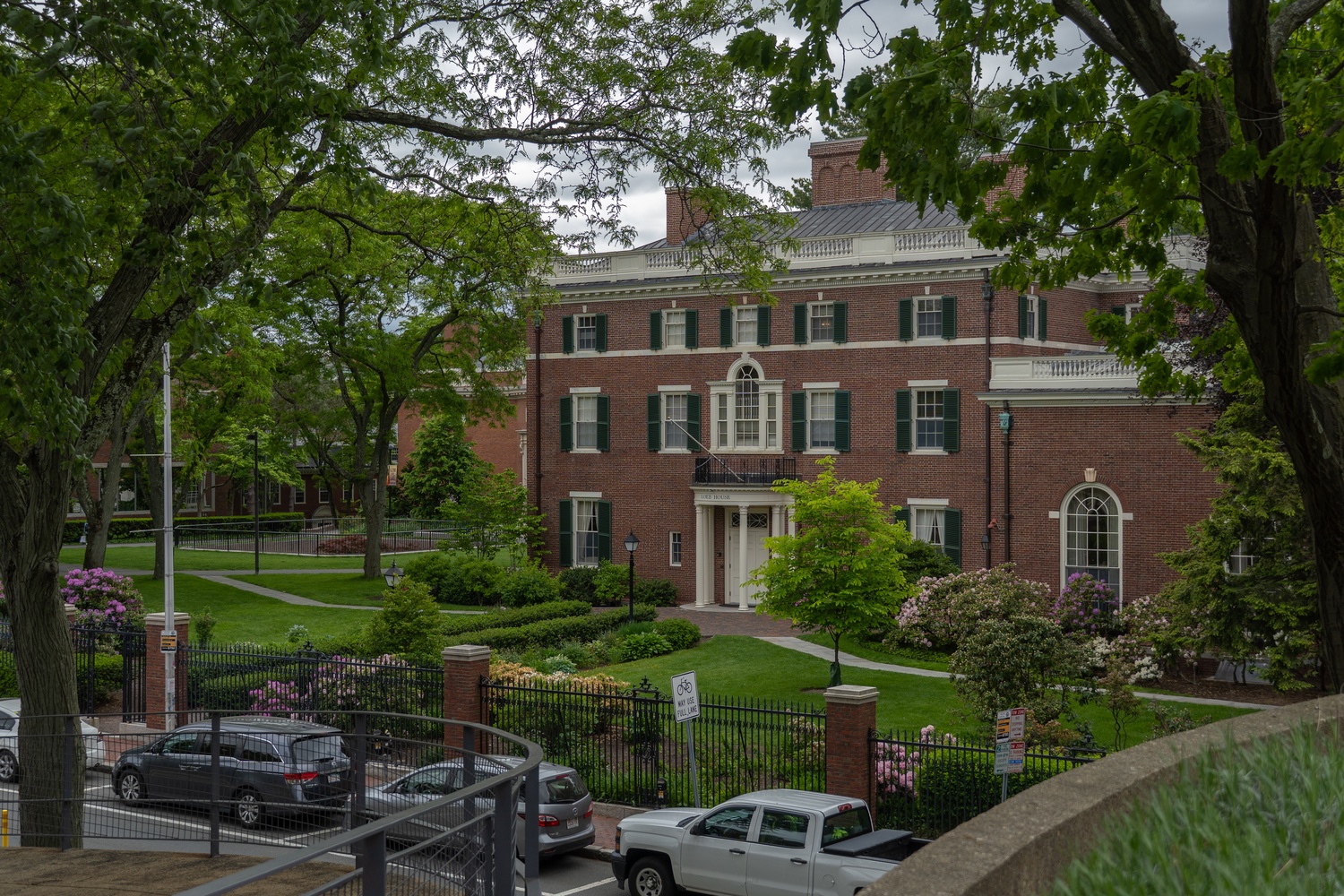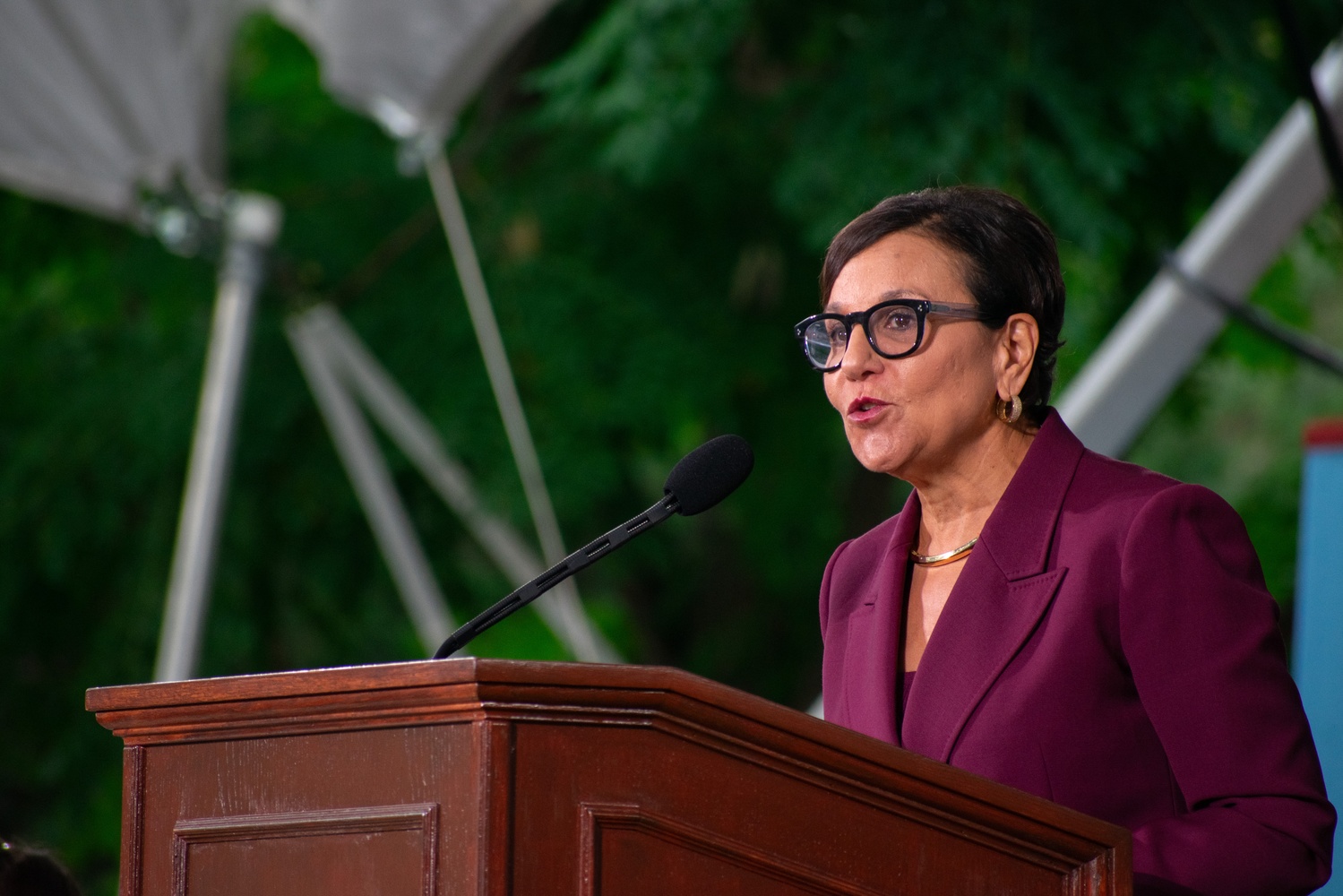
News
Summers Will Not Finish Semester of Teaching as Harvard Investigates Epstein Ties

News
Harvard College Students Report Favoring Divestment from Israel in HUA Survey

News
‘He Should Resign’: Harvard Undergrads Take Hard Line Against Summers Over Epstein Scandal

News
Harvard To Launch New Investigation Into Epstein’s Ties to Summers, Other University Affiliates

News
Harvard Students To Vote on Divestment From Israel in Inaugural HUA Election Survey
Penny Pritzker Says She Has ‘Absolutely No Idea’ How Trump Talks Will Conclude

Harvard Corporation senior fellow Penny S. Pritzker ’81 said on Sunday that the Trump administration had pushed for a $500 million settlement to resolve its six-month standoff with the University — but cast doubt on whether Harvard was considering the sum.
Pritzker’s comments, made after University’s governing boards convened on campus for the first time since Harvard’s confrontation with the Trump administration erupted this spring, were also the first statements by a top Harvard official on the status of settlement talks.
The talks appeared to grind to a halt after a judge ordered the reinstatement of billions of dollars in frozen federal funds earlier this month. But over the summer, reports suggested Harvard was closing in on a deal with the White House that would involve a half-billion dollar payment to restore the University’s federal funding and halt the administration’s barrage of federal investigations.
“I’ve heard the Trump administration say that,” Pritzker said when asked about the $500 million figure by a Crimson reporter outside Loeb House, where the Corporation and Harvard Board of Overseers met for more than five hours.
Pritzker — and Jennifer M. O’Connor ’87, Harvard’s general counsel, who accompanied her from Loeb House — are all but certain to be consulted in any potential settlement with the Trump administration. Asked whether her remark suggested that Harvard was not considering the $500 million figure, Pritzker repeated her statement.
Harvard has kept its cards close since negotiations reopened this summer. It has not once publicly acknowledged the existence of any talks and has only nodded to their existence in private conversations with top-dollar donors.
Pritzker said on Sunday that outcomes remained up in the air.
“I have absolutely no idea how this is going to play out. I really don’t,” she said.

When asked Sunday about the status of the talks, Harvard Provost John F. Manning ’82 declined to answer, offering only a tight smile before walking away.
Harvard Corporation fellows Joseph Y. Bae ’94, Kannon K. Shanmugam ’93, and Mariano-Florentino Cuéllar ’93 all declined to comment on the status or terms of the settlement talks or the content of the Sunday meeting when approached by a Crimson reporter while exiting the meeting. Nine Overseers also declined to comment on the meeting.
Harvard’s settlement talks with the Trump administration were first publicized by President Donald Trump himself in June, when he announced on Truth Social, his social media platform, that negotiations were underway. At that time, he pledged that a “HISTORIC” deal would be struck “in the next week or so.”
But three months later, Harvard and the White House have yet to publicly agree on a set of terms.
The two sides traded offers over the summer, but after the Trump administration secured a $200 million deal with Columbia University, it escalated its demands on Harvard. Within days, Trump was personally urging White House officials to ensure Harvard paid more than Columbia.
At one point, Harvard reportedly agreed to pay $500 million toward workforce development initiatives in exchange for winning back its frozen funds and terminating the slew of investigations into its hiring, admissions, and academic practices.
That number has been a sticking point. In a conversation with a faculty member over the summer, Harvard President Alan M. Garber ’76 disputed reporting surrounding the sum, suggesting that it had been leaked by the Trump administration. As late as Aug. 27, President Donald J. Trump demanded at a Cabinet meeting that Harvard pay “nothing less than $500 million” to restore its federal funding, calling the University “very bad.”
After U.S. District Judge Allison D. Burroughs’ September decision, Harvard has regained some leverage in the talks, but little is certain. An appeal is expected in the funding case, the fate of international students remains in limbo, and nearly a dozen federal investigations into Harvard remain open. The Education Department hit Harvard with two new threats to its access to federal financial aid earlier this month.
The Trump administration has made other extensive demands of Harvard, though it is unclear what other terms are under consideration. In April, the White House demanded Harvard gut diversity-related programming, place restrictions on protests on campus, and address ideological homogeneity among students and faculty. It also asked Harvard to address the growing presence of “activist faculty” and install leaders committed to carrying out the administration's demands.
The Trump administration also floated proposals for overhauling the highest levels of Harvard’s governance in a confidential memo sent to the University’s lawyers earlier that month. Suggestions included reducing the Harvard Alumni Association’s influence over Board of Overseers elections and imposing a 15-year minimum “acceptable leadership experience” requirement for Harvard presidents.
In early April, when the Corporation and Board of Overseers last convened together in Cambridge, the crisis was only just beginning to play out. A $9 billion review of federal funding had been announced just days before, and the Trump administration had yet to send its final list of demands. Members of the Corporation still believed it was possible to negotiate and avert a confrontation, according to reports in the New York Times from the spring.
Less than a week later, the Trump administration made its demands official. Garber publicly rejected them as an illegal attempt to exert unprecedented control over Harvard. One week later, Harvard took its fight to court.
In the months since, the University has rolled back a series of programs targeted by federal Republicans. But Harvard officials have maintained that they are committed to institutional independence — and pressed forward with two lawsuits accusing the Trump administration of violating Harvard’s First Amendment rights.
“Our principles will guide us on the path forward,” Garber wrote in an email after Burroughs’ order restoring Harvard’s federal funding.
—Staff writer Dhruv T. Patel can be reached at dhruv.patel@thecrimson.com. Follow him on X @dhruvtkpatel.
—Staff writer Saketh Sundar can be reached at saketh.sundar@thecrimson.com. Follow him on X @saketh_sundar.
Want to keep up with breaking news? Subscribe to our email newsletter.
